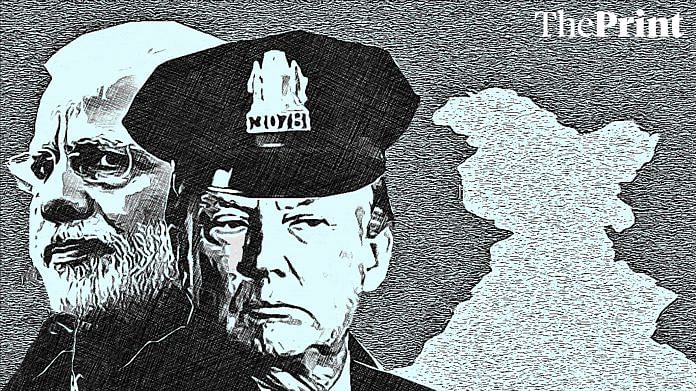PM Narendra Modi Monday held his first conversation with US President Donald Trump on the Kashmir issue since the abrogation of Article 370 as well as the latter’s offer to mediate. Trump later asked Pakistan PM Imran Khan to consider the “need to reduce tensions and moderate rhetoric with India”.
ThePrint asks: Is PM Modi allowing Trump to play policeman in India-Pakistan tensions over Kashmir?
During crisis situation, other countries have become active to defuse tension between India & Pakistan
 Arun Singh
Arun Singh
Former Indian Ambassador to the US
India’s consistent position has been that there is no scope for any third-party role in India-Pakistan issues, including Jammu and Kashmir. However, during a crisis situation, other countries have become active to defuse the tension.
We have seen this during the Kargil conflict in 1999, after the terrorist attack on the Indian Parliament in December 2001 and the subsequent response and mobilisation of troops by India, and after this year’s terror attack in Pulwama and the counter-terror action taken by India in Balakot.
US President Donald Trump’s phone call with India’s Prime Minster Narendra Modi and Pakistan Prime Minister Imran Khan Monday was in line with this. In his tweet after the two calls, he referred to working towards ‘reducing tensions’. In February this year, along with the US, several other countries too were reportedly active in defusing the situation and working for the release of the captured Indian Air Force pilot Wing Commander Abhinandan Varthaman.
While President Trump has spoken to the Prime Ministers of both the countries and asked Pakistan to tone down its rhetoric, he cannot be seen as playing the role of a policeman.
India has embarked on a perilous path and must be stopped
 Abdul Basit
Abdul Basit
Former Pakistan High Commissioner to India
Under PM Modi, India is openly flouting democratic principles and international norms. So, it becomes incumbent upon the international community to take full cognisance of what the Modi government is up to and how dangerous it is to regional peace and stability. India has embarked on a perilous path and must be stopped.
It is not surprising that within India many opposition parties have rejected the unilateral abrogation of Articles 370 and 35A, and called the move ‘mala fide’ and ‘unconstitutional’.
Under the irrefutable norm of international law ‘Erga Omnes’ (towards all), it is the responsibility of all states to ensure that the right to self-determination is not obstructed or violated. The US and other major powers must wake up to their international obligations rather than sulk in their commercial and economic interests.
Kashmiris too have unanimously rejected the unconstitutional amendments. PM Modi needs to introspect. He can never succeed in suppressing Kashmiris. India has no right to suppress the fundamental human rights of Kashmiris and endanger regional stability. PM Modi is playing with fire.
Also read: India’s No First Use is badass enough. Modi govt needn’t change it to be more muscular
The real issue is how the Modi govt can deal with a powerful stakeholder like Trump while moving forward
 Pranay Kotasthane
Pranay Kotasthane
Fellow & Faculty at Takshashila Institution
Policeman is an incorrect metaphor to use. The act of policing involves ensuring compliance with an underlying rule of law. No such enforceable force of law exists in the domain of international relations. Instead, power is the currency in international relations. It is precisely for this reason that Trump’s stance and actions on India-Pakistan tensions are important following the Narendra Modi government’s move to abrogate Article 370.
The real issue then is how the Modi government can deal with a powerful stakeholder like Trump now. While India needs the US in order to increase its own economic and military power, the US-China structural rivalry makes India a very important player in the US strategic calculation. Pakistan doesn’t feature in any of these forces driving the India-US equation.
For its part, Pakistan will try to use the Kashmir issue to drive a wedge between the US and India. From Pakistan’s standpoint, returning to the India-Pakistan hyphenation era in the eyes of the US is desirable. And given Pakistan’s role in the ongoing talks between the US and the Taliban, Pakistan’s case is likely to carry more weight than it otherwise would. India’s challenge will be to continue isolating the US-India relationship from the ongoing India-Pakistan dynamic. This task will become more challenging if the security situation in Kashmir worsens.
Any outside intervention will be fraught with serious consequences for both India and Pakistan
 Avinash Mohananey
Avinash Mohananey
Former Intelligence Officer posted in Kashmir & Islamabad
Kashmir evokes strong sentiments on both sides of the India-Pakistan border. In both countries, domestic electoral politics remain hostage to the Kashmir issue. The rhetoric was bound to be shriller from Pakistan’s side after India changed the constitutional status of Jammu and Kashmir.
Pakistan Prime Minister Imran Khan, the civilian façade of the Pakistan Army, has been pushed to a situation where he will have to now go by what his army decides on India. And this would only mean more violence unleashed on India through its proxies.
The call between PM Modi and President Trump should be seen in this perspective. Everyone would agree that the international pressure on Pakistan has to be relentless.
At the same time, India should remember that right now, the main priority for Trump in the region is to withdraw US troops from Afghanistan. Whether we like it or not, Pakistan is the key to delivering what Trump wants before he faces the next US presidential elections.
It is a harsh reality that no country is an honest interlocutor. Any outside intervention will be fraught with serious consequences for both India and Pakistan.
The Indian leadership realised this long back. Having seen the play by world powers in the UN, it was wise on India’s part to make Kashmir a bilateral issue with Pakistan after signing the Simla Agreement and the Lahore Declaration.
Also read: This is why PM Modi doesn’t really care about internationalisation of Kashmir issue
Will not call Trump’s act mediation. It is his goodwill – he’s staking his reputation by making this offer
 Zahid Syed
Zahid Syed
Former Pakistan Ambassador
I wouldn’t use the word policeman because that would be an incorrect analogy in international relations. US President Donald Trump is staking his reputation and trying to mediate. In fact, I would not even call it mediation, I would refer to it as goodwill. Neither India nor Pakistan should see this as an unfriendly act. Trump’s offer should be welcomed.
If this issue is not mediated or discussed by the US, then there is a possibility that the situation will worsen and both India and Pakistan will suffer. Most Pakistanis are in favour of this mediation. They appreciate Donald Trump’s sentiments.
What must be understood is that both the countries involved are not speaking to each other, and there is a lot of suspicion. Trump will not dictate terms – he will only facilitate a dialogue. We have been handling the Kashmir issue bilaterally for many years now.
One must also realise that during the recent Lok Sabha elections, the Indian nationalist propaganda was whipped up to such an extent that it had made it difficult to handle a situation like this with Pakistan. But this also emboldened Indian Prime Minister Narendra Modi to unilaterally take the Kashmir decision.
The right of Kashmiris to self-determination has been completely disregarded. Pakistan is providing both political and moral support to the Kashmiris.
Finally, it is also important to understand what an international dispute entails. When two countries cannot agree on an issue and go to an international forum, then the issue becomes an international dispute.
In post-Cold War era, every US govt has had an inherent intention of mediating in the Kashmir issue
 Nayanima Basu
Nayanima Basu
Diplomacy Editor at ThePrint
India has always maintained that it does not want any country to intervene on matters that are bilateral in nature vis-a-vis Pakistan, especially on the Kashmir dispute. This is one of the main reasons why India denounced the role of UNMOGIP (United Nations Military Observer Group in India and Pakistan) post the Simla Agreement of 1972, which clearly stated that Kashmir will be treated as a bilateral issue between New Delhi and Islamabad.
However, what needs to be understood here is that in the post-Cold War era, every successive US administration has had an inherent intention of mediating in the Kashmir issue. Although, the US first attempted to mediate in the dispute in 1962, it intensified its attempts following the end of the Cold War. In the 1980s, the Reagan administration gave its consent for a multibillion-dollar military and economic assistance package to Pakistan, which continues to date although its size has reduced drastically.
President Clinton also wanted to be a mediator in the Kashmir issue and resolve it once and for all during the 1999 Kargil conflict. Coming to President Trump, he has openly spoken about his ambitions to resolve the Kashmir issue.
But today, with the scrapping of Kashmir’s special status, the great game in the Himalayan region has changed. What Trump may be planning to do right now is something that PM Modi knows all too well. The US does not want any further movement or changes by either India or Pakistan — as far as issues concerning the Line of Control, the Line of Actual Control and the International Border are concerned. Apart from this, the Trump administration’s biggest priority remains the withdrawal of its troops from Afghanistan.
So, it remains to be seen if Modi will allow Trump to play the role of a policeman, given that the choices are limited.
Also read: Imran Khan used Modi excuse to give Bajwa extension. But General can’t save him from rivals
By Revathi Krishnan and Taran Deol




Toning down the temperature is good for India. If Pakistan is being forced to live up to its bargain of bringing Taliban for a ceasefire, then that is also good because it keeps the current govt in Afghanistan as a stakeholder. Not every conversation about Kashmir is a problem for us. We need to pick and choose what conversations we like and what we don’t. China’s overt calls on Kashmir, particularly as they themselves have changed the status quo, are a problem and they must be made to pay a price for it. Removing Huawei as a supplier of equipment could be one such measure. Preventing Chinese mobile manufacturers from the Indian markets could be another response. India has to use the full gamut of its diplomatic, economic and military power.
Totally agree. Neither trample nor be trampled upon. The timing is perfect. There is no need to be touchy about foreign media outbursts. But there is a need to draw a sand in the line vis-a-vis Pakistan, whether it be the US or the UK. With China, only cunning diplomacy and ambush offensive will work (just what they do at present with us).
With China differences should not become disputes …
Let’s hear your logic for your assessment.
The complete cessation of a bilateral dialogue – I think it started over the issue of the Pakistani envoy meeting Hurriyat leaders – has created a vacuum. A very dangerous vacuum, as Pulwama / Balakot showed. The diplomatic stance now oscillates, No dispute, Kashmir is an internal matter, the only issue that might warrant discussion is reclamation of PoK. When NFU is placed on the table, rather on Twitter, it is time for the world to take notice. 2. At the moment, the US needs Pakistani help and facilitation on Afghanistan. A major flare up to the east would be most unhelpful. Even absent that, Kashmir has returned to the UNSC. Time to give wisdom, sagacity, diplomacy a chance.
Ashok,
Your logic has reached it’s expiry date. If diplomacy were helpful the problem wouldn’t have lingered on for 70 years.
You conveniently forget that we have fought 4 overt wars, and decades of proxy war losing countless soldiers and civilians.
Your love for Pakistan and peace peace games will only perpetuate this cycle of death.
No, Shri Ashok Lal is right! The US has now flagged detentions by the Delhi government in Kashmir. A US State Dept. senior official, who did not want to be named., has told a group of journalists in Washington DC that, “The US believes that the abrogation of Article 370 by India is an internal matter for the country but has external ramifications”.
“We recognize that it’s an internal matter, but it obviously has implications outside of India’s borders. And so we have long called for direct conversations between India and Pakistan to resolve what have been the decades of tensions generated by that issue, “ the official said.
“And so I think when you look at our approach to Kashmir we focused in the near term on the human rights situation, encouraging India to move quickly to release detainees to restore basic freedoms, to implement what the Prime Minister laid out in his own address of a return to political normalcy for Jammu and Kashmir, whether first as a Union Territory but then as a State and the restoration of political dialogue. So we look to the India government to undertake those steps,” the official said.
So, not only the US expects India to talk with Pakistan, and resolve the matter, but also expects India to restore the statehood to J&K.
So, not only the US expects India to talk with Pakistan, and resolve the matter, but also expects India to restore the statehood to J&K.
All parties realize that there is no chance of that happening.